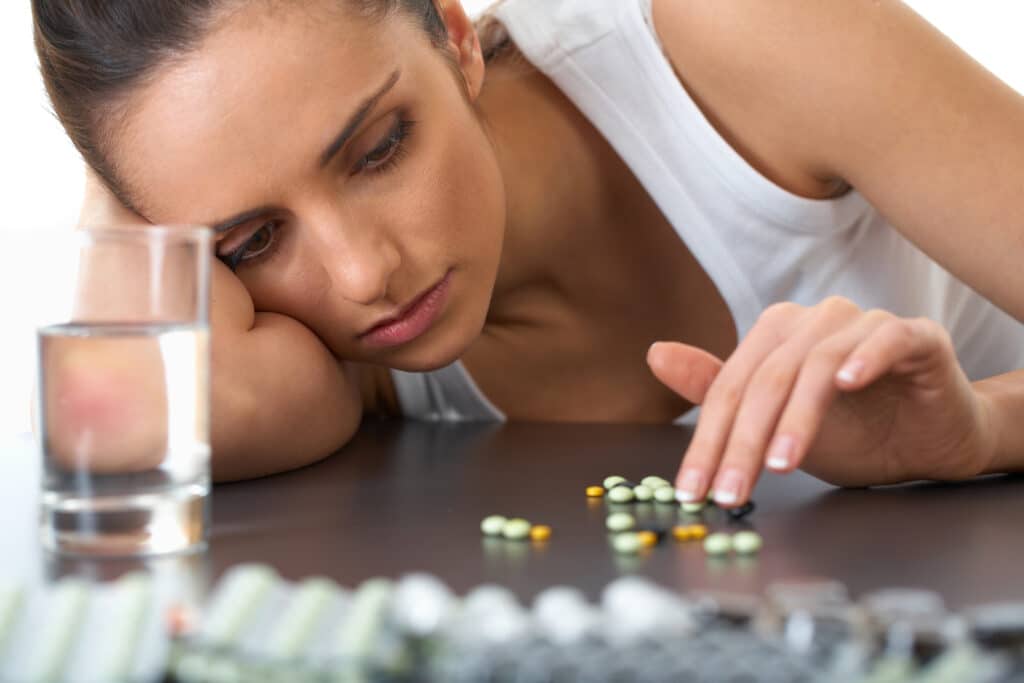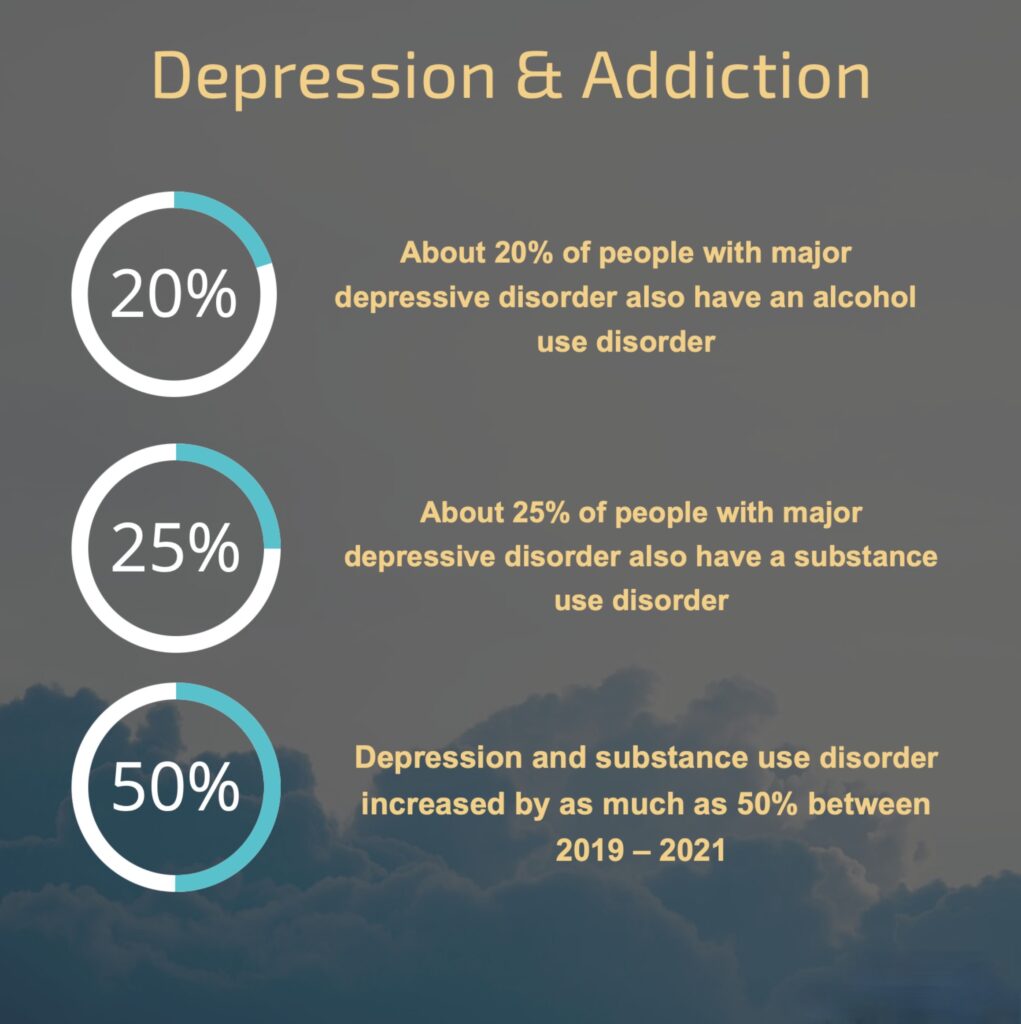How to help someone with Drug Addiction and Depression
Substance use disorder and mental health conditions have a close relationship and often have major effects on each other. This condition is referred to as co-occurring disorder or having a dual diagnosis. Depression is one of the most common mental health disorders affecting an estimated 280 million people worldwide, according to the World Health Organization. The combination of drug addiction and depression affects millions more. In fact, major depressive disorder is the most commonly diagnosed mental health condition among those who experience a dual diagnosis.
An estimated 50 million Americans live with mental health illnesses such as depression and anxiety. Research found that people with depression and substance use disorder increased by as much as 50% and has contributed to drug overdose deaths between 2019 – 2021. About 25% of people with major depressive disorder also have a substance use disorder. About 20% of people with major depressive disorder also have an alcohol use disorder. And about 11% of people with major depressive disorder also have some sort of illicit drug use disorder.

What are the subtle signs of depression?
Major depressive disorder is a common and serious form of mental illness that can affect how you feel, the way in which you think and how you act. Depression is characterized as an illness of emotional dysregulation. This happens when the pain receptors in your brain are turned on and pain signals from the peripheral nervous system become amplified. The mood disorder can also cause people to experience persistent sadness and other emotional and physical issues that inhibit the ability to function at work, home or in a social environment.
Other signs of depression
- Persistently sad
- Feelings of hopelessness
- Feelings of irritability
- Feelings of guilt
- Difficulty concentrating
- Difficulty sleeping
- Physical aches and pains
- Persistent thoughts of death or suicide
- Increased anger
- Becoming withdrawn and isolated from society
- Increased engagement in high-risk activities
- Greater impulsivity
- Increased use of alcohol or drugs

Depression from grief is a normal feeling that many people experience in their life. However, for most people, these feelings are fleeting and eventually go away once an event or circumstance has passed. A person with major depressive disorder is characterized when their depression continues to persist and becomes more problematic in spite of changes in conditions. It causes feelings that are intense and chronic.
A person who is grieving and experiencing feelings of depression, often experience painful feelings in waves mixed with positive and happy memories associated with the event. In a person experiencing clinical depressive disorder, their mood and interests begin decreasing for two weeks or more. With grieving people, their overall self-esteem is preserved. In depressive patients, they have continued feelings of self-loathing and worthlessness.
An estimated 21 million adults in the U.S. have experienced a major depressive episode. More than one in ten young people in the U.S. live with major depressive disorder. Depression can affect all age groups. Studies show that people ages 18-29 have the highest level of prevalence of depression. This is followed by people ages 45-64.
Research has found higher rates of depression among Black, LatinX and Indigenous communities. Some common contributing factors to this statistic include higher rates of poverty, generational trauma, medical stigma and distrust of medical and authoritative institutions. The bias, microaggressions, and lack of cultural sensitivity play significant factors in why these high-risk communities do not receive care.
There are many other factors that can contribute to the development of depression. In some cases, it can be hereditary. People who have immediate family members living with depression have two or three times greater risk of developing depression. Females are also more likely to have depressive episodes. According to the National Institute on Mental Health, women are often doing most of the emotional labor. This includes caregiving such as childcare and elderly care. This results in a lack of self-care, lack of sleep and lack of nutrition. These combined factors produce stress and a greater increase in developing depression.
Types of Depression
- Dysthymia – This is a mild form of depression. It can occur when someone suffers from a continuous unhappy mood that lasts more than 1-2 years. It is a chronic condition. When substance abuse develops as a result of this type of depression, it can mask negative emotions.
- Atypical depression – In this type of depression, people experience symptoms of depression but their mood can be briefly uplifted with the news of a positive event. This type of disorder often leads to the usage of alcohol or addictive substances to self-medicate and can result in deteriorating emotional and behavioral issues.
- Substance-induced depression – This type of disorder first appears after a person starts using a new mind-altering substance. It appears after excessive use or during withdrawal. It can improve when a person lowers the amount of substance they are using or stops using entirely.
- Major depression – Major depression includes symptoms of a depressed mood or loss of interest in activities once enjoyed. These feelings often last up to 2 weeks and can interfere with a person’s daily life.
- Persistent depressive disorder – This type of depression consists of less severe symptoms of depression that can last for much longer. An average episode can last for at least 2 years.
- Perinatal depression – This type of depression occurs during or after pregnancy. It is different from depression which happens after a baby is born, which is known as postpartum depression.
- Seasonal affective disorder – This type of depression is characterized by feelings that come and go with the seasons. The symptoms typically start in the late fall and early winter and go away once spring and summer arrive.
- Depression with symptoms of psychosis – This severe form of depression occurs when a person experiences psychotic symptoms such as delusions or hallucinations.
Check Your Insurance Coverage for FREE
Find out if your insurance covers addiction treatment in minutes. We accept most insurance!
How to help someone with Drug Addiction and Depression
Depression is a mental health condition that can last anywhere from weeks, to months and years. Depression affects people of all ages, races, ethnicities and genders. When a mental health disorder like depression occurs alongside a substance use disorder, it can result in a slow deterioration of a person’s quality of life. They often give up on social activities and hobbies they once enjoyed. They are in denial and refuse to acknowledge their problem. They begin experiencing hardships in personal and professional relationships. And they begin to slowly self-isolate from others and society.
Evidence has found that people with depression are almost two times as likely to self-medicate with substances such as alcohol. Self-medicating occurs when a person attempts to soothe and manage unpleasant emotions in an effort to lift their mood, get some sleep or even boost their energy. Dealing with emotional distress can be difficult and self-medicating is a common characteristic in those suffering from untreated mental health disorders. The substances provide temporary relief but eventually become addictive, causing more harm in the future. Even going as far as worsening any depressive and mental illness conditions.
Reach out to Hotel California by the Sea
We specialize in treating addiction and other co-occurring disorders, such as PTSD. Our Admissions specialists are available to walk you through the best options for treating your addiction.
For those who are suffering from a substance use disorder and depression dual diagnosis, behavioral health treatments are effective in helping people overcome their struggles. At Hotel California by the Sea, rigorous treatment programs and various levels of care provide options for those who experience co-occurring disorders. Intensive therapies such as CBT, DBT and EMDR therapy provide a psychological approach to healing symptoms of depression or any other mental health conditions present. Medication-assisted treatments and other forms of medication management are also highly effective in helping clients safely remove addictive substances from the body. Oftentimes, the body has become so accustomed to the drug, it will not be able to function properly without it and cause physical ailments in the client.
Hotel California by the Sea understands the importance of customized and individualized treatment. Each person faces different obstacles during their addiction and recovery. Each person should receive his or her own unique and comprehensive treatment plan. There is not one size fits all when it comes to substance and alcohol addiction treatment. Behavioral health services that offer substance use disorder treatment and mental health disorder treatments, provide a well-rounded program in helping people suffering from a dual diagnosis.
References:
https://www.forbes.com/health/mind/depression-statistics/
https://www.psychiatry.org/patients-families/depression/what-is-depression
https://www.nimh.nih.gov/health/topics/depression
https://www.medicalnewstoday.com/articles/8933
https://www.addictioncenter.com/addiction/depression-and-addiction/
https://www.healthline.com/health/depression/does-depression-lead-to-substance-abuse
